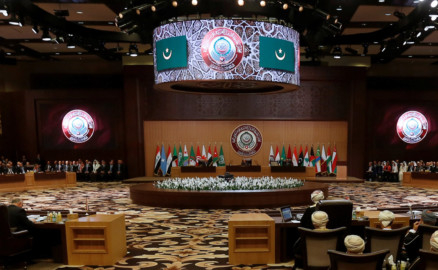
Many are hoping that the Palestinian problem will take centre stage in the deliberations of the Arab heads-of-state, said the Jordan Times. “As many political observers rightly note, the Palestinian issue is the one subject on which all Arabs see eye to eye. Next to Palestine, Iraq’s fight against Daesh [the self-proclaimed Islamic State of Iraq and the Levant] enjoys growing Arab consensus, so Baghdad should be supported in its bid to win a decisive victory over this terrorist group that wreaked havoc on the region. The war against Daesh is not just a regional matter. It has absorbed the international community at large, and understandably so. It may be more difficult to be optimistic about the possibility of an end to the Syrian conflict that destroyed an industrious nation’s country almost entirely, but the Arab heads-of-state could still voice support for the Geneva-based peace talks aiming at solving the Syrian conflict.”
This Arab Summit is an exceptional one because it is being held during circumstances and events that must be confronted with a unified Arab spirit, that is confident of overcoming all difficulties and crises facing the Arab nation, said Saudi Arabia’s Al Yaum. “A promising future for the Arab nation lies in the unification of Arab ranks and consolidating inter-Arab relations in an efficient manner. This will help achieve the desires and goals of all Arabs and help serve the mutual interests of Arab nations. The summit held in Amman represents a turning point for supporting all means necessary for resolving pending Arab crises and ease Arab crises and settle them in a manner that maintains Arab unity and preserves their status among countries and people around the world.”
It seems like it is the fate of displaced Iraqi civilians to pay the price twice: Once when Daesh took over Mosul and for the second time when Iraqi forces and the international coalition attacked to free the city from the terrorist organisation, said Qatar’s Al Watan.
“According to Iraqi and international reports, hundreds of civilians have fallen victim to the international coalition’s air strikes on Mosul, which led to the Iraqi government taking the decision to halt the attack for retaking the city. Official reports from the coalition led by the United States spoke about investigating reports, which stated that around 200 civilians were killed in air strikes on west Mosul. Meanwhile, the city’s civil defence said that more than 3,000 people have been killed since the start of the attack on west Mosul, back in January.”
The horrifying massacre that hit residents in west Mosul indicates a very dangerous failure to the matter of protecting civilians, said UAE’s Al Bayan. “It is a reality that reminds us of the fears expressed by local populations regarding the participation of sectarian militias, who take their orders from sectarian Iranian leaders, known for their disregard for the lives of defenceless citizens. The massacre also reminds us of the principle of protecting civilians during times of war, which is of utmost priority and a humanitarian responsibility. It is a responsibility that must be shouldered by the forces carrying out combat operations in populated areas, as well as either political or military leaders of these forces.”




_resources1_16a31069e4e_small.jpg)







